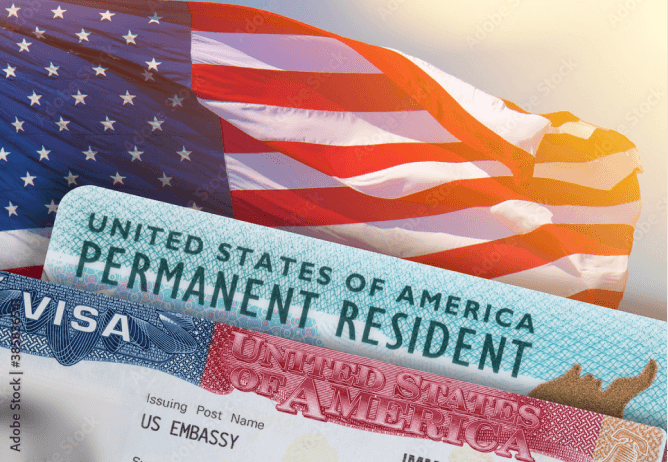Lawful Permanent Residency
Lawful Permanent Residency allows a person to live and work permanently in the United States. After a certain period of time, an LPR (lawful permanent residency) or “green card” holder can apply for Naturalization to become a US Citizen.
There are many pathways that a person can become eligible to apply for a green card. Helen Tarokic Law, PLLC can help with the following:
- Family of a US Citizen
- Spouse
- Fiancé(e) and their child(ren)
- Parent of a Citizen who is 21 or older
- Unmarried child under age 21
- Married son or daughter
- Brother or sister of a US citizen who is 21 or older
- Family of a Green Card Holder
- Spouse
- Unmarried child under age 21
- Unmarried son or daughter of an LPR who is 21 or older
- Green Cards based on Employment Categories
- EB-1: Extraordinary Ability, Outstanding professors and researchers, Certain multinational manager or executive
- EB-2: Advanced Degree or Exceptional Ability
- EB-3: Skilled Workers, Professionals, Unskilled (Other) Workers
- EB-4: “Special Immigrant” categories, including religious workers, certain broadcasters, certain retired officers of a G-4 international organization or NATO-6 civilian employees, certain employees of the US government who are abroad, members of the US armed forces, Panama Canal company or Canal Zone government employees, Certain physicians licensed and practicing medicine in the US as of Jan 9, 1978, and S Nonimmigrants.
- EB-5: Immigrant Investors
- Victims of Human Trafficking (T Visas)
- We have a section of our website devoted to T visas. Generally, a person with T visa status should be able to apply for a green card, either through an “early adjustment of status” process that typically begins right after being approved for T status, or through a regular application that is filed three years after the person has held T status and lived in the United States.
- Victims of Crime (U Visas)
- We have a section of our website devoted to U Visas for victims of crime. Generally, a person with U Status should be able to apply for a green card after three years of holding the status and living in the United States. Their family members derivative U status can also usually adjust after three years of holding that status and living in the United States.
- VAWA Self-Petitioners: The applicant suffered battery or extreme cruelty (forms of domestic violence) from:
- Their spouse, who is a US Citizen or LPR, or
- Their child, who is a US Citizen, or
- Their parent who is a US Citizen or LPR (if the child applicant is unmarried and under 21)
We have a section on our website devoted to providing more information about VAWA.
Adjustment of Status based on T Visa
T Visa applicants and their derivative family members may be eligible to apply for Lawful Permanent Residency (Green Card) after three years in qualifying status.
Some T visa holders may even qualify to apply for Lawful Permanent Residency status within the same year that their T-1 case is approved. This is known as “Early Adjustment” and this option is available if law enforcement have completed their investigation of the trafficking crime and/or no longer need the victim-Applicant’s active participation in the investigation because the case is inactive or closed out. Our legal team will guide the Applicants on whether Early Adjustment is an option for them.
Adjustment of Status based on U Visa
U Visa applicants and their derivative family members may be eligible to apply for Lawful Permanent Residency (Green Card) after three years in qualifying status.
After receiving U-1 or U Derivative status, it is important to have a consultation with our legal team so we can guide you to start gathering the required documents and information to prepare the application. We may also need to file for extension of U status for derivative family members to meet the three year physical presence rule.
Overview of the Adjustment of Status Application
The Form I-485 and other associated forms for the Adjustment of Status application require many documents and information about the Applicant and their family. You can expect that your legal team will do a detailed overview of your immigration history and your life history, both since you have been in the United States and before you came to this country. The information we ask for may include evidence of the following:
- The Applicant’s physical presence in the United States for a particular period of time (with exceptions for T derivatives),
- The Applicant’s good moral character, including records of criminal offenses,
- The Applicant’s financial status (with exceptions for T, U, and VAWA applicants),
- Employment history,
- Address history,
- Identification documents, birth records for Applicant and family, marriage/divorce records, tax filings, and other evidence of your life history and your life in the United States.
- Updated vaccinations and a medical exam (with specific instructions provided during legal representation as to the requirements for the medical exam and as to where and when it should take place).
Some residency processes require a interview at USCIS, and some do not. Some residency processes result in a temporary green card, and others result in a full 10-year permanent residency.
Consular processing
Some applications for residency cannot be completed inside the United States. For cases that will undergo a consular process, at a US Embassy or Consulate abroad, the legal team will work through those stages step by step to try to reunify families as quickly as possible.
Litigation related to long wait-times
For some residency cases, whether they are through a US consulate abroad or through USCIS in the US, filing a lawsuit to speed up the process may be needed. Our law firm partners on litigation in certain types of cases and can advise whether litigation is a good option.

Discuss Your Legal Needs During an In-Depth Case Evaluation.
Take the first step by scheduling a consultation with our team.


